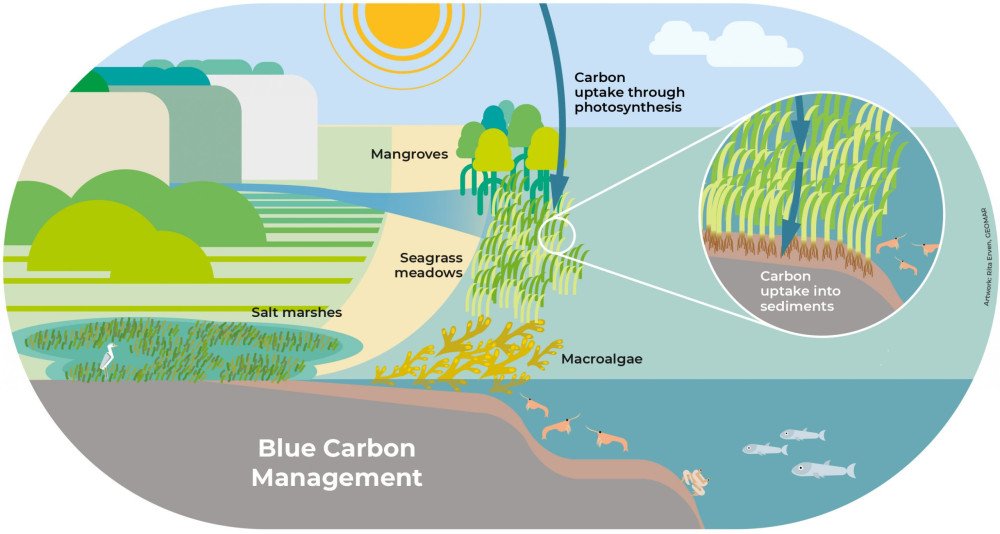

Blue Carbon: Preserving Mauritius' Coastal Ecosystems
Mauritius, an enchanting island nation in the Indian Ocean, is renowned for its pristine beaches, turquoise waters, and vibrant marine life. However, beneath the surface lies an ecosystem with immense ecological value known as blue carbon. Blue carbon refers to the carbon captured and stored by coastal ecosystems, including mangroves, seagrasses, and salt marshes. These ecosystems play a vital role in mitigating climate change and safeguarding the health of our planet. In this blog, we will explore the significance of blue carbon in Mauritius and the efforts being made to conserve these precious coastal habitats.
The Importance of Blue Carbon:
Coastal ecosystems such as mangroves, seagrasses, and salt marshes are exceptionally efficient at capturing and storing carbon dioxide from the atmosphere, making them crucial in combating climate change. Mangroves, with their intricate root systems, can sequester carbon up to four times more effectively than terrestrial forests. Similarly, seagrasses are highly efficient at absorbing carbon, and salt marshes act as carbon sinks, trapping significant amounts of carbon in their soil. By preserving these blue carbon ecosystems, we can reduce the concentration of greenhouse gases in the atmosphere and mitigate the impacts of climate change.
Blue Carbon in Mauritius:
Mauritius boasts a diverse range of coastal habitats that contribute significantly to blue carbon storage. The island is home to extensive mangrove forests, sprawling seagrass meadows, and lush salt marshes. These ecosystems provide numerous benefits, including:
Climate Regulation: Blue carbon habitats in Mauritius absorb and store large amounts of carbon dioxide, playing a vital role in regulating the climate and mitigating global warming.
Coastal Protection: Mangroves act as natural buffers against storm surges and coastal erosion, protecting Mauritius' shoreline and reducing the impact of extreme weather events.
Biodiversity Hotspots: These coastal habitats harbor a rich array of flora and fauna, providing critical habitats for marine species, including endangered turtles, fish, and migratory birds.
Conservation Efforts:
Recognizing the significance of blue carbon ecosystems, Mauritius has taken proactive measures to protect and restore these coastal habitats. Several conservation initiatives and government policies are aimed at preserving the island's blue carbon resources:
Mangrove Reforestation: The Mauritian government, in collaboration with local communities and environmental organizations, has initiated mangrove reforestation programs. These initiatives involve planting mangrove saplings in areas where mangrove forests have been depleted or damaged.
Marine Protected Areas: Mauritius has established marine protected areas to safeguard its seagrass meadows and coral reefs. These protected zones promote sustainable fishing practices and regulate human activities to ensure the preservation of coastal ecosystems.
Public Awareness and Education: Environmental awareness campaigns and educational programs are being conducted to engage the local population and raise awareness about the importance of blue carbon ecosystems. These initiatives encourage individuals to actively participate in conservation efforts.
International Cooperation: Mauritius actively engages in international collaborations and partnerships to exchange knowledge and resources related to blue carbon conservation. This cooperation enables the island to benefit from global expertise and secure funding for conservation projects.
Conclusion:
Mauritius, with its remarkable coastal beauty, serves as a prime example of the importance of blue carbon ecosystems. The preservation and restoration of mangroves, seagrasses, and salt marshes not only contribute to carbon sequestration but also support biodiversity, protect coastal areas, and enhance the resilience of the island against climate change impacts. By valuing and safeguarding these unique habitats, Mauritius demonstrates its commitment to sustainable development and becomes a global steward of blue carbon conservation.
Through ongoing efforts and continued collaboration, Mauritius can inspire other nations to prioritize the preservation of blue carbon ecosystems, ensuring a sustainable and vibrant future for our planet. Let us join hands to protect these invaluable coastal habitats and embrace the transformative power of blue carbon.


